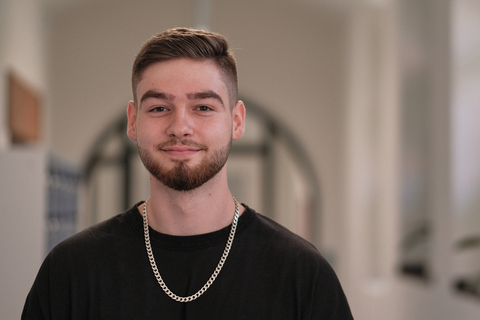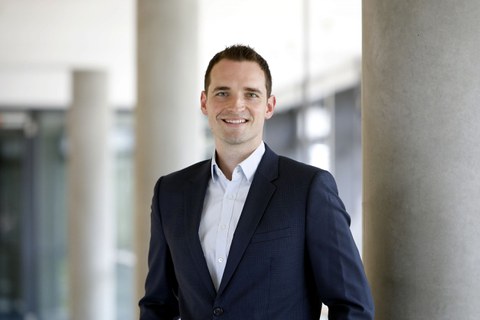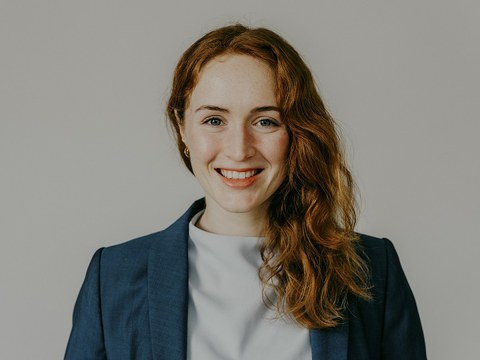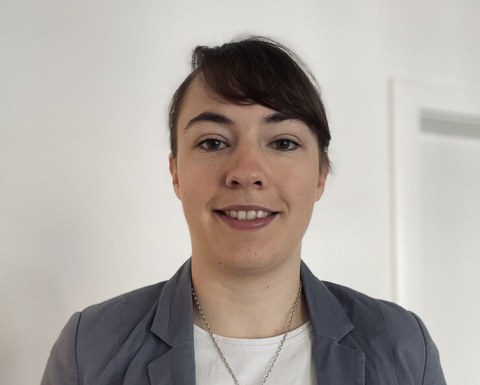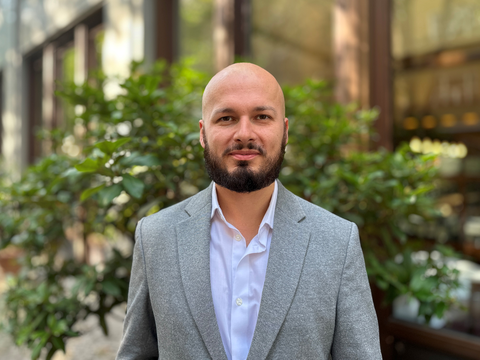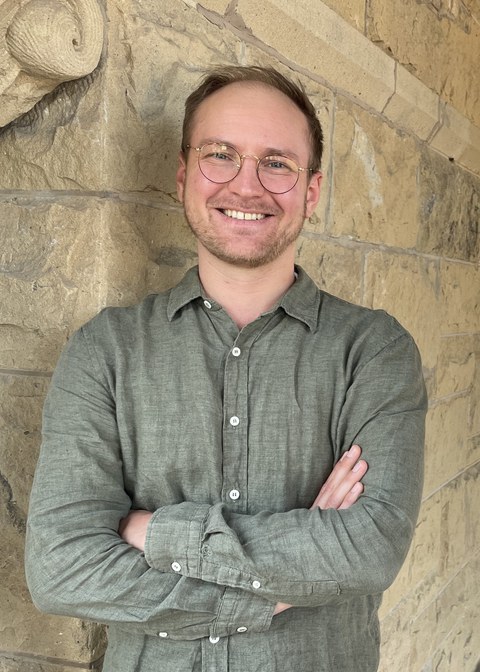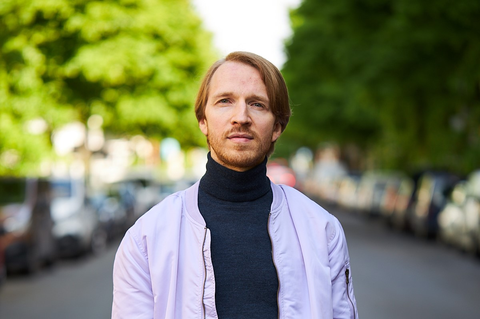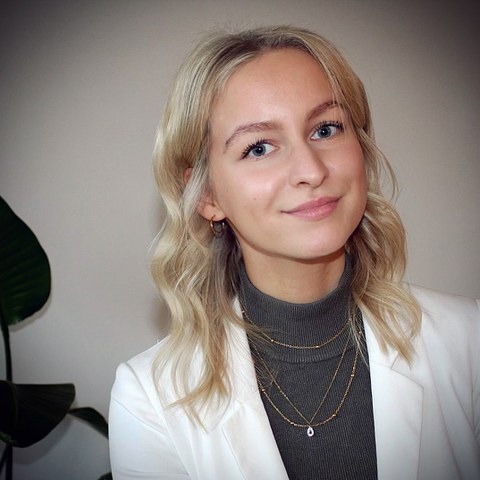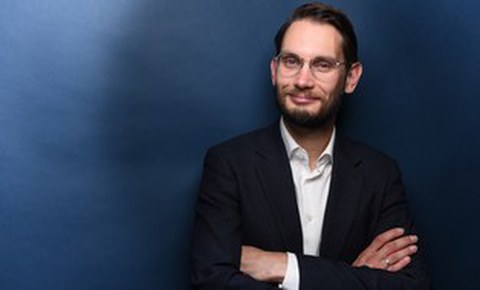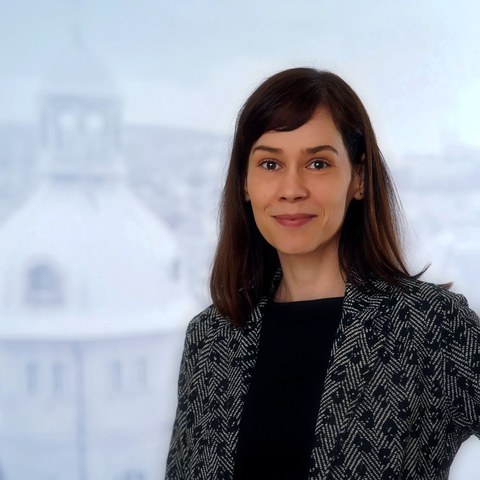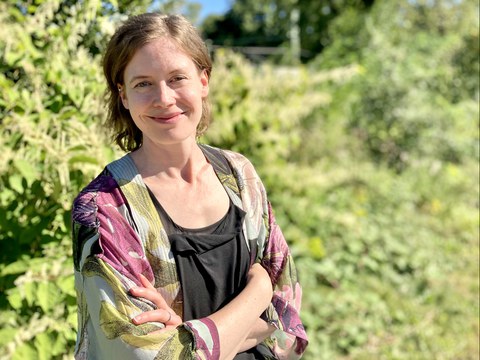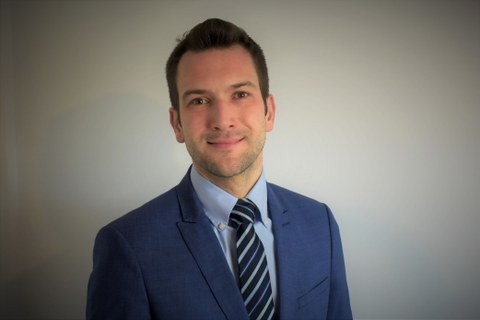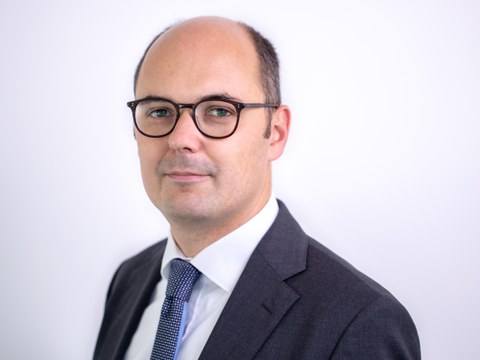New at the Faculty
Table of contents
2025
Fritz Seltmann
From July 1, Fritz Seltmann will be joining the team at the Computing Lab. During his time at school, Fritz Seltmann completed various internships at companies such as AOK Plus and Porsche. After graduating from high school, he trained as an IT specialist for system integration at the Center for Advancing Electronics Dresden (cfaed) at TU Dresden, which he recently completed successfully.
Fritz Seltmann is looking forward to his new role in the computer science laboratory, where he will be able to contribute his knowledge in the field of system integration and develop new technical solutions together with the team. He is also particularly looking forward to working with students and colleagues and to supporting the faculty with exciting IT projects.
Silvia Hack
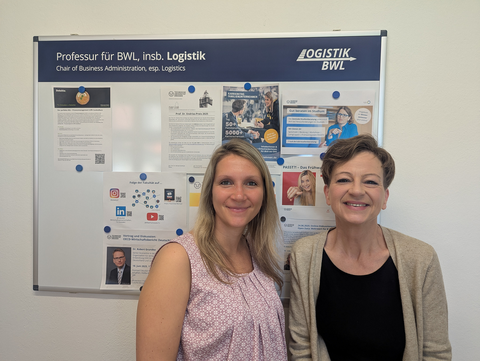
Christin Peschel and Silvia Hack
Since the beginning of June, Silvia Hack has been working in the secretariat of the Chair of Business Administration, in particular Logistics, as a parental leave replacement for Christin Peschel. Silvia Hack studied archaeology in Innsbruck and graduated with a diploma. After working mainly on projects for numerous institutions that carry out archaeological excavations (universities, museums, heritage offices, etc.), she switched to scientific administration and was employed at the Austrian Academy of Sciences. In the meantime, Silvia Hack also worked as a tour guide in Spain and Portugal. Since 2018, she has been based in Dresden for private reasons and worked as a team assistant in a patent law firm for more than five years until the end of May 2025.
Prof. Dr Patrick Zschech
Patrick Zschech is holding the Chair of Business Information Systems, esp. Intelligent Systems and Services since May 1, 2025. He was previously a professor at the University of Leipzig and held an open-topic tenure-track professorship at FAU Erlangen-Nuremberg from 2021 to 2023, where he headed the BMBF-funded junior research group ‘White-Box-AI’ together with Mathias Kraus. Patrick Zschech successfully completed his doctorate at TU Dresden in 2020 with the dissertation ‘Data Science and Analytics in Industrial Maintenance: Selection, Evaluation, and Application of Data-Driven Methods’.
1) I would like to convey to students that ...
... business information systems are much more than simply automating routine tasks such as order processing or payroll accounting. Rather, it is about actively shaping the digital future with the help of modern technologies such as generative AI, deep learning, IoT, process mining, robotics, augmented reality, etc. Technical expertise such as programming, data analysis and the development of algorithmic solutions are of course of central importance. However, it is just as important that we never lose sight of people and their needs - because all these technologies should serve to make people's everyday lives easier and not burden them with unnecessary developments. I would therefore like to invite students to join us in immersing themselves in a world in which we not only develop computer systems that perform simple tasks for us, but also design innovative solutions that support and inspire people - so that the digital future really does become a better future for everyone.
2) When building up my Chair team, it is important to me ...
... that we work together to identify research topics that each individual is fully committed to. My aim is to create an environment in which my staff can work on their topics with passion, curiosity and inquisitiveness and start the day with intrinsic motivation. Gaining knowledge - both individually and for the team as a whole - is my top priority, even before pure publication performance in high-ranking outlets. I also attach great importance to an interdisciplinary team with complementary skills - from algorithmic development and programming to the design of experimental studies and an in-depth understanding of suitable social science explanatory approaches. I also believe it is essential that we conduct research as equals in our team, which is why I want to promote flat hierarchies, short communication channels and an open and honest culture of criticism.
3) My most exciting research project to date has been about ...
... investigating the conditions under which people are more willing to share their personal data when using personalised sleep and health apps. We differentiated between whether the data is processed by a human, a black box AI or a white box AI. Although most users stated in a survey that they would NOT share sensitive data in particular (such as information on sexual activity, drug use or mental health status), they nevertheless disclosed a large proportion of this data in the context of actual data collection. This phenomenon is referred to in the literature as the "privacy paradox" and I was not aware of it until then. The results of the project were therefore quite exciting. In addition, we observed a slight tendency for users to be more inclined to entrust their sensitive data to a black box AI compared to a human or a white box AI. However, as these findings were not yet significant in our setting so far, further research is needed to gain more certainty about this.
4) Current research topics I am working on are, ...
... all questions around the topics "Interpretable Machine Learning (IML)" and "Explainable Artificial Intelligence (XAI)". I am interested in, for example:
- the algorithmic development of novel, comprehensible machine learning models and their testing in real application areas,
- the integration of IML and XAI approaches with generative AI or large language models (e.g. in the form of conversational agents as a personalised dialogue interface between model and user),
- the operationalisation of the difficult-to-measure construct "interpretability" from a socio-technical perspective as well as possible linking potentials to established methods from the field of NeuroIS research,
- the implementation of user-centred experimental and evaluation studies, esp. taking into account explanatory approaches from the field of behavioural economics (key point: "Thinking, Fast and Slow"),
- building bridges to the field of "Causal Machine Learning" to uncover and consider causal relationships.
However, since all these fascinating topics cannot be worked on alone, I am already looking forward to the numerous opportunities for collaboration within our faculty and with other cooperation partners in the TU Dresden network. :-)
Dr. Ann Sophie Lauterbach
Dr. Ann Sophie Lauterbach has joined the faculty on 01.04.2025. She completed her doctorate in Organizational Behavior on the topic of innovative workspace design and its impact on employee behavior at the Future of Work Lab, University of Konstanz. She has published her research in international journals such as Environment and Behavior, PLoS ONE, and the German Journal of Human Resource Management, as well as practice-oriented outlets like Inequality Policy Papers, PERSONALquarterly, and Zeitschrift Führung + Organisation (ZFO).
1) What has your professional/academic career been like so far?
I studied Politics and Public Administration at the University of Konstanz and completed a Master's in Work and Organizational Psychology at Maastricht University. I then returned to Konstanz to pursue my PhD within the project "Digitalization, Automation and the Future of Work in Post-Industrial Welfare States" at the Cluster of Excellence "The Politics of Inequality", graduating with summa cum laude. During my PhD, I did several research stays and collaborated with researchers from Aix-Marseille School of Economics, Harvard School of Public Health, and BI – Norwegian Business School. Teaching is something I am genuinely passionate about, so I was particularly happy to receive the Best Lecturer Award in my department (with over 60 faculty members) in 2024.
2) Why did you decide to move to Dresden?
What really stood out to me was the application process led by Professor Razinskas. Unlike many others, it went beyond the usual job talk and formal interview by also offering the opportunity to get to know the team and the campus, which made a big difference for me. It also became clear that I would have considerable freedom in defining the focus and direction of my postdoc, and I was convinced by the excellent academic reputation of the Faculty of Business and Economics as well as the Center for Demography and Diversity. And on a more personal note, I was also excited about the chance to join the Dresden 7s rugby team – an unexpected bonus.
3) What are your research interests?
During my PhD, I specialized in understanding how technological and physical changes in the workplace affect employee behavior and well-being, particularly in terms of attendance patterns such as presenteeism and absenteeism. Currently, my research interests revolve around three main areas: First, testing the necessity assumptions of self-determination theory in relation to employee well-being. Second, exploring how employees form attitudes toward artificial intelligence. And third, identifying ways to improve the health and well-being of immigrants in the workplace.
4) And what topics are you interested in from a methodological point of view?
I am primarily a quantitative researcher and mostly work with field studies to examine real-life organizational changes and derive practical implications. Methodologically, I'm particularly interested in applying both frequentist and Bayesian statistical approaches, depending on which best fits the specific research question.
Linda Heinze
Linda Heinze has been working in the Dean's Office of the Faculty since March 2025 and supports in the preparation and provision of information for students and prospective students, quality management in studies and the supervision of committee meetings and faculty events.
1) What has your professional career been like so far?
After my training as an administrative assistant at the city administration in Plauen, I moved to the Faculty of Business and Economics at TU Dresden in November 2015. Over a longer period of time, I worked simultaneously at the Chair of Business Administration, in particular Energy Economics, and at the Chair of Business Administration, in particular Sustainability Management and Corporate Environmental Economics. In addition, I have also "helped out" in shorter periods at the Junior Professorship of Business Administration, in particular Strategic Management, in the Faculty's Examination Office, in research funding and in the legal department. From August 2020 to March 2023, I completed further training as an administrative specialist at the Meißen University of Applied Sciences (FH) and further education center. I was also on maternity leave and parental leave from July 2021 to June 2023 and from December 2023 to February 2025.
2) You are now moving from the office of a chair to the faculty level. What are your expectations and what are you particularly interested in in your new role?
I have set myself the goal of quickly familiarizing myself with the new tasks, especially in the area of study matters, even though I have had less experience in this area so far. I am confident that I can acquire new skills that will help me develop both personally and professionally. I am also looking forward to the challenges that lie ahead. What particularly interests me about my new role is the opportunity to contribute my own ideas, to be actively involved at faculty level and to work with different groups of people.
3) How do you think you can contribute the experience you have gained so far to your work in the Dean's Office?
In my previous activities, I have gained insights into a wide range of administrative structures, processes and subject areas and have already been able to build up a good network. I think that both can benefit the work in the Dean's Office. Thanks to my experience in event management, I can contribute both my knowledge and creative ideas to strengthen the visibility and activities of the faculty.
2024
Prof. Dr. Stefan Razinskas
Prof. Dr. Stefan Razinskas has held the Chair of Business Administration, in particular Organization and Management at the Faculty since 01.10.2024. Stefan Razinskas is moving to Dresden from the FU Berlin, where he has held a Junior Professorship of Management since 2020. Stefan Razinskas successfully completed his doctorate at WHU Otto Beisheim School of Management in 2016 and then worked as a postdoctoral researcher at LMU Munich until 2019.
1) I would like to convey to students that ...
... that skills for collaboration and constructive cooperation will be of great benefit to them both now during their studies and in their future careers. It is therefore particularly important to me to highlight interpersonal aspects of modern organizational and management theory in my courses and to make them tangible through practical examples. Since organizational structures are designed and lived by people, I hope to prepare students for their professional work in such a way that they can critically question simplistic views of complex issues and use the scope they are given to shape them in a theory-based way.
2) When building up my Chair team, it is important to me ...
... not only to ensure a thematic fit between the research interests of my staff and the core topics of the Chair, but also to grow together as a team on an interpersonal level. A trusting relationship within the team is not only important for the staff members' independent research and teaching, but also for dealing with the setbacks that usually accompany academic careers. A supportive and appreciative working atmosphere within the team is therefore particularly conducive to maintaining the joy of working together in the Chair team and teaching in the lecture hall, even in challenging times.
3) My most exciting research project to date has been about ...
... the role of diversity and time pressure in teams. Using an experimental study, my co-authors and I were able to show that gender-diverse teams have an advantage over homogeneous teams in terms of performance due to their team composition. However, under time pressure, these teams cannot sufficiently develop the advantages of their diversity. This project has not only made an important scientific contribution to the framework conditions of effective collaboration in diverse teams, but has also enriched me personally. During our data collection, in which we accompanied around 150 teams in the experimental laboratory, I was able to gain a better understanding of various aspects of teamwork as an observer and was inspired for subsequent research projects.
4) Current research topics ...
... continue to be strongly influenced by my interest in successful collaboration despite not always favorable conditions. Using a broad spectrum of methodological approaches in organizational and management research, I am not only concerned with the design of team-based organizational structures, but also with cooperation between managers and leaders. I am particularly interested in how conscious (e.g. spatial and hierarchical) and unconscious (e.g. social and personal) differences between the participants in team and leadership contexts affect their cooperation. I am confident that I will be able to successfully continue these interdisciplinary research topics together with my team at TU Dresden.
Dr. Andreas Leibing
Andreas Leibing has been a Research Associate and Postdoc at the Chair of Quantitative Methods, esp. Econometrics since May 2024.
1) What has your professional/academic career been like so far?
After completing my Bachelor's degree in Economics in my hometown of Göttingen in 2016, I went to LMU Munich for my Master's degree in Economics, where I worked for a long time as a Student Assistant at the ifo Institute. In 2019, my journey then continued to Berlin, where, after a year of doctoral studies at the Berlin School of Economics, I started and recently completed my doctorate at Freie Universität. I have been employed as a Research Associate at DIW Berlin since 2020. Particularly nice moments during this time were also my semester abroad in the Master's program at the Université Paris-Saclay and my research stay at Stanford last year.
2) Why did you decide to move to Dresden?
I am convinced that TU Dresden offers me ideal framework conditions to prepare for a Chair. On the one hand, there is excellent funding here for postdocs and in the acquisition of third-party funding, and on the other, I have the freedom to pursue my research projects in a targeted manner. The proximity to Berlin allows me to maintain and expand my existing networks and, after many years at research institutes, I am delighted to be able to develop a comprehensive teaching concept. Finally, the beautiful campus also offers an absolute feel-good factor. I am looking forward to being here and to many collaborations.
3) What are your research interests?
I would like to contribute to a better understanding of the factors that influence individual educational decisions and educational success. On the other hand, I want to show how the state can create optimal framework conditions that enable young people to fully exploit their potential and meet the changing demands of the labor market. A current and perhaps the most exciting project from the TUD's point of view is concerned with the effects of degree program rankings (such as the CHE ranking) on students' choice of subject and university.
4) And what topics are you interested in from a methodological point of view?
I primarily use microeconometric methods. However, I am less interested in individual methods per se, but rather in the question of how to select and carry out the right method given the right question and data. I would also like to impart this knowledge to students. Above all, however, I am also interested in the tension that arises from the identification of local causal effects (design-based approach) and their transferability to theoretical questions and policy recommendations.
Junior Professor Dr. Ignas Bruder
Ignas Bruder has held the Junior Professorship of Business Administration, in particular Strategy and Business Ethics, since 01.08.2024. Ignas Bruder studied Management & Marketing at the FU Berlin. In July 2020, he completed his dissertation entitled "Essays on Social Entrepreneurship and Sustainable Organizing - An Ethically Focused Practice-Based Perspective", also at the FU Berlin. Until his move to Dresden, Ignas' brother had been a postdoctoral researcher at the Hertie School Berlin since 2022, where he worked as part of the Horizon Europe-funded project REBALANCE: Investigating the Relationship between Social enterprises and Democracy.
For me, being a Junior Professor means ....
... a great honor and recognition that brings with it a lot of creative freedom. I am looking forward to developing my own courses, which I hope the students will find exciting. I can also hardly wait to implement my research projects in such an excellent environment and to contribute to the faculty.
I would like to convey to the students that ...
... that business practice is riddled with ethical issues and that as a manager you are better equipped if you have the academic tools to reflect on these issues in an informed way. I want to provide students with orientation knowledge so that they can not only carry out tasks later in their careers, but can also make well-founded assessments as critical thinkers. The focus areas of strategy and business ethics in particular require that teaching goes beyond the mere transfer of knowledge to include skills development. My aim is for students to develop strategic competence and the ability to reflect on business ethics.
3) My most exciting research project to date has been about ...
... it's really difficult to single out just one, because my heart beats for every single one of my research projects. When I talk about my research, my ethnographic work in social enterprises and other alternative organizations in particular resonates with the public because it provides detailed insights into the strategic processes of these extraordinary organizations. For example, many people find it fascinating how a social enterprise in the natural cosmetics sector manages to prioritize sustainability over profit interests and still survive economically.
Current research topics that I am working on are ...
... social entrepreneurship, corporate sustainability, democratic organizing, practical theories and integrative business ethics. In the field of social entrepreneurship, I am interested in how social enterprises try to organize social transformation. For example, I am researching how social enterprises manage to influence profit-oriented companies to pursue their social purposes. In terms of corporate sustainability, I am investigating how sustainability-oriented companies can use self-reinforcing mechanisms to ensure their economic survival while, paradoxically, prioritizing social and ecological aspects over profit interests. In democratic organizing, I am particularly interested in how the reproduction of democratic principles within a company develops repercussions outside the company, be it in business relationships or in the communities in which these companies are embedded. In relation to theories of practice, I conduct basic social science research on how practices drift unnoticed and on recursive processes of accumulation. Currently, I am also working on the development of an integrative business ethics view of strategy with a special focus on strategy-as-practice.
Junior Professor Dr. Jacqueline Schmidt
Jacqueline Schmidt holds the newly established Junior Professorship for Business Education and Management Training, in particular Digitalization in Educational and Working Environments and has been working at the faculty since 01.01.2024. Jacqueline Schmidt studied Business Education and Management Training at Leipzig University, where she also completed her doctorate. She successfully completed her dissertation entitled "The basic knowledge of artificial intelligence of (prospective) teachers in the vocational education sector - model-based test development and validation" in September 2023.
1) For me, being a junior professor means ...
... great recognition and great responsibility at the same time. I am delighted to have the opportunity to further develop my teaching and research activities in an excellent environment and to be able to set priorities independently. At the same time, I see it as my duty, especially towards the students, to represent those topics in my teaching that I consider to be particularly relevant and forward-looking.
2) I would like to convey to students that ...
...that Business Education and Management Training is an incredibly exciting and multifaceted field with numerous interfaces to other disciplines and that researching the complex issues is really fun! Particularly in the field of (vocational) education, we can not only react to transformation processes, but can also initiate them as an important shaping factor. By incorporating current research projects and results into teaching, I want to share not only my enthusiasm for the subject, but also my enthusiasm for research and scientific work with the students and enable a lively discourse.
3) My most exciting research project to date has been about ...
This is a very difficult question, as all the projects I have had the opportunity to work on are and have been very interesting without exception! As a rule, they are about changes in vocational education and training that are either caused by digitalization or made possible by it. One very exciting joint project that I was able to work on as part of a collaboration, for example, involved the use of video napkins that confront students with challenging situations in their future professional practice while they are still studying. This allows them to be sensitized to these challenges and develop initial strategies for overcoming them in a protected environment.
4) Current research topics that I am working on are ...
Questions of digital transformation in vocational education and training contexts driven by developments in the field of artificial intelligence. For example, the question of which AI-related skills are required by vocational training personnel and to what extent these skills facets are developed. So far, I have primarily focused on school education personnel. In the future, I also want to look at the specific needs and challenges in vocational education and training. These studies are so important because it is only on the basis of these findings that we are in a position to develop (further) training courses that are appropriate for the target group. In this context, I am also interested in questions relating to the acceptance of AI-supported systems and what measures can be used to promote this.
2023
Dr. Philipp Richter
Dr. Philipp Richter has been at the faculty since 01.10.2023. He completed his doctorate in corporate management on the topic of shared service centers at ESCP Europe in Berlin. He has published his research projects in international journals such as the European Management Review, European Management Journal and the Journal of General Management as well as practice-oriented journals such as WPg - Die Wirtschaftsprüfung.
1) What has your professional/academic career been like so far?
I studied Business Administration in Magdeburg, Vienna and Bielefeld and specialized in the subject combination of Finance, Accounting, Controlling and Taxation (FACT). I worked as a Research Associate at the Chair of Business Ethics and Controlling at ESCP Europe in Berlin and completed my cumulative dissertation on "The Emergence of Shared Service Centers in Multidivisional Corporations: Theoretical Considerations and Empirical Evidence" with summa cum laude. I found the doctoral period enormously enriching, as I gained a view beyond the FACT area and this has strongly influenced my research interests.
After my doctorate, I wanted to get a taste of practical experience. I therefore worked in two Berlin start-ups (most recently as Head of Finance) and built up the finance and accounting departments. Despite the exciting and mostly time-consuming projects, I remained loyal to science in various research projects during my practical phase. In Dresden, I am now very much looking forward to an intensive exchange and the start of my habilitation.
2) Why did you decide to move to Dresden?
I was particularly attracted by the strong research profile of the new Chair of Management Accounting and Control . I see excellent opportunities here to develop further in terms of content and methodology. The framework conditions also played an important role for me. The TU enjoys an excellent reputation as a university of excellence. As a native Saxon, I also know that Dresden is a beautiful city!
3) What are your research interests?
I am interested in both management and accounting topics, which is why I find this area of business administration so appealing. I am particularly interested in aspects that are answered in the interaction between the CFO and CEO. Specifically, I research questions relating to corporate governance, aspects of sustainability performance and non-market strategies (i.e. CSR and lobbying) of companies. A current example: Do different preferences regarding the attitude towards sustainability between shareholders and board members lead to the introduction of sustainability targets in the remuneration system of CEOs? Or in other projects: Does effective corporate governance have an impact on the non-financial capabilities of companies?
4) And what topics are you interested in from a methodological perspective?
Methodologically, I have gone through a development process. For example, my cumulative publication projects in the dissertation were quite heterogeneous in terms of methodology. I worked with conceptual, qualitative and quantitative methods. In my current research, I use quantitative-empirical methods, especially archival-empirical and survey-based methods to answer my research questions.
Prof. Dr. Kamila Cygan-Rehm
Prof. Dr. Kamila Cygan-Rehm has held the Chair of Quantitative Methods, in particular Econometrics, since 01.10.2023. Kamila Cygan-Rehm completed her doctorate in 2013 at the University of Erlangen-Nuremberg (FAU) and subsequently worked there for several years as an academic advisor. Until she moved to TU Dresden, she headed the research group "Outcomes of Education Across the Lifespan" at the Leibniz Institute for Educational Trajectories (LIfBi) in Bamberg.
1) I would like to convey to the students that ...
a correlation between certain phenomena does not imply a causal relationship. Understanding this principle is fundamental for decision-making processes in business, science and politics. A central question is how to design an analysis with available data so that a causal interpretation is possible. You can find tips on this in my courses, to which I cordially invite you. From the coming winter semester, I will be expanding the range of courses in the field of econometrics and empirical methods. Hopefully, I will also be able to share my passion for empiricism with the students.
2) When building up my Chair team, it is important to me ...
to create a working atmosphere of mutual esteem and respect. Everyone in the team should receive both the support they need and sufficient freedom to develop their individual skills and interests. There are many exciting and varied activities in research and teaching that we will work on together. This requires commitment and mutual support. I am currently looking for committed Student Assistants. Please get in touch with me if you are interested in economic and socio-political issues.
3) My most exciting research project so far has been about ...
I find all my previous research projects exciting. Otherwise I probably wouldn't have started them. Most of them deal with the econometric evaluation of various political interventions. From the impact of parental allowance to mini-job reforms and school enrolment regulations - I investigate the direct and indirect effects of political decisions on the individuals or organizations affected. The main goal is to better understand their impact on our society in order to derive solid foundations for evidence-based policy.
4) Current research topics I am working on are, ....
Currently, the focus of my work is on two core areas. First, I am investigating the financial and non-financial effects of school policies over the life cycle. For example, I analyze the lifelong consequences of missed schooling on labor market success using the example of shortened school years in the 1960s in Germany. On the other hand, I explore how policy interventions set the course for early childhood inequalities and children's later life trajectories. A new project is looking at the consequences of universal screening for gestational diabetes.
Dr. Ilka Weissbrod
Ilka Weissbrod has been working as a postdoc at the Junior Professorship in Sustainability Assessment and Policy since 01.09.2023. She brings a wealth of international and practical experience to her new role, as she explains in the interview.
1) What has your professional/academic career been like to date?
I am a sustainability scientist with a passion for business. My anchor point is innovation processes and, fortunately, over the years I have been able to deal in depth with various facets of sustainability, for example systems thinking, metrics, learning alliances and transitions. At Imperial College London, I did my PhD at the Centre for Environmental Policy on 'Business Experimentation for Sustainability', with close research links to the Institute for Manufacturing at the University of Cambridge. In Germany, I was a postdoc at the Leuphana University Center for Sustainability Management. At the same time, I had exciting assignments in practice, for example the last 2 years as 'Director Sustainable Circularity' at an industrial design and innovation agency in Hamburg and, in the course of a secondment, as 'Sustainable Circular Economy Systems Expert' in a national research-oriented innovation project for the manufacturing industry in Ireland.
2) Why did you decide to move to Dresden?
As a visiting researcher, I was enthusiastic about the national and international collaborative approach and the multidisciplinary research approach of Samanthi Dijkstra-Silva. The content and framework conditions of this temporary postdoc position were simply perfect. I am very happy to be able to get to know a second German university and a Faculty of Business and Economics.
3) What are your research interests?
I summarize my research interests as 'learning for sustainable innovation processes', specifically entrepreneurial experimentation for sustainability. I am particularly interested in the inclusion of urgency in the implementation of sustainable innovation. Two other research interests are defining the impact of operationalizing a circular economy on innovation processes in business and industry, and applying systems thinking to scale sustainable innovation.
4) And what topics are you interested in from a methodological perspective?
It is very important to me that research in the field of sustainability in business is relevant for the 'researched'. That's why I follow the action research approach and mainly use qualitative methods. In the UK, I have experienced the action research approach as valuable at prestigious universities during my PhD and this has deeply shaped my research methodology. For example, I am a research collaborator at the Innovation Agency where I have worked for the last 2 years: this means we are interested in answering a common research question and I will work on this question with data from and within the agency, while deciding independently on research design, data collection modes and outputs.
Prof. Dr. Peter Schäfer
As of 01.07.2023, Prof. Dr. Peter Schäfer will hold the Chair of Business Administration, in particular Management Accounting & Control. Prof. Dr. Peter Schäfer comes from the TU Munich. Among other things, he researches and teaches Executive Compensation and Top Management Incentives and Management Controls.
1) I would like to convey to the students that . ..
... you can do a lot right and a lot wrong with the selection and design of controlling systems in a company. Small changes can have big effects. It is important to first realize what goal you want to achieve with a controlling system. Do I want to support decisions such as pricing or product design? Do I want to create incentives? Do I want to support non-financial goals, such as environmental or social goals? What is good for one goal can be harmful for the other. A key question is therefore how to select and design the most suitable system. I would therefore like to invite you to my lectures and seminars. Starting in the winter semester, I will be supplementing the existing courses in the field of controlling already offered by Prof. Günther and his team.
2) When building up my Chair team, it is important to me...
... to convey enthusiasm for our subject to the staff and to provide them with the best possible support. There are many exciting questions that we want to research with joint commitment. This enthusiasm also shapes our teaching. Regular exchange and a lively culture of academic discussion and debate are the basis for mutual success. I am currently looking for employees who are passionate about this.
3) My most exciting research project to date has been about ...
I find the vast majority of research projects exciting. We work on new questions that are important for business practice. In our field, we look at how companies can best design their controlling systems. One example: some companies evaluate their management boards not only on the basis of their own success, but also in comparison with competitors. How well have we done compared to other companies in our sector? We have found that boards with such a relative performance measurement tend to align their strategies more closely with those of other companies. They are less likely to choose innovative strategies that would differentiate their company from standard industry approaches - a highly relevant finding especially for innovation-driven companies.
4) Current research topics that I am working on are,....
... remuneration systems and evaluation of board members or other controlling systems such as transfer pricing and budgets. A current example: Do supervisory boards learn a lot about whether their board members are suitable for the job during crises? Or in another project: how can companies reduce budget slack, i.e. the buffer that managers sometimes build into their target figures? In addition to the classic topics from controlling, I am also interested in questions at the interfaces to other research areas. I'm looking forward to exchanging ideas with my new colleagues here at TU Dresden.
Prof. Dr. Lars Hornuf
Lars Hornuf has held the Chair of Business Administration, in particular Finance, at the Faculty since March 1, 2023. He is moving to Dresden from the University of Bremen, where he has held the Chair of Financial Services and Financial Technology since 2017.
1) I would like to convey to students that ...
... the financial sector is undergoing fundamental change and is one of the most exciting areas of Business Administration and Economics.
2) When building my Chair team, it is important to me that ...
... the team is passionately committed to research and teaching.
3) My most exciting research project to date has been ....
Every research project is exciting! Otherwise you wouldn't start it. But the questions under which circumstances people donate their data for a good cause, whether East or West Germans generally cheat more or less and whether celebrities are better investors were particularly exciting.
4) Current research topics I am working on are, ....
- Financial technology (FinTech), in particular crowdfunding, blockchain technology and robo-advice
- Sustainable Finance
- Data economy and data protection
- crowdworking
Archive
More interviews can be found in the archive.

